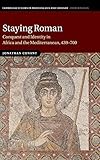Staying Roman [Texte imprimé] : conquest and identity in Africa and the Mediterranean, 439-700 / Jonathan Conant
نوع المادة : نصالسلاسل:Cambridge studies in medieval life and thought (Cambridge University Press, Cambridge). fourth series تفاصيل النشر:Cambridge ; New York ; Melbourne [etc.] : Cambridge University Press, 2012وصف:1 vol. (XVIII-438 p.) : cartes, graph., couv. ill. ; 24 cmتدمك:
نصالسلاسل:Cambridge studies in medieval life and thought (Cambridge University Press, Cambridge). fourth series تفاصيل النشر:Cambridge ; New York ; Melbourne [etc.] : Cambridge University Press, 2012وصف:1 vol. (XVIII-438 p.) : cartes, graph., couv. ill. ; 24 cmتدمك:- 978-0-521-19697-0
- 939.704 21E
- 961.001
| نوع المادة | المكتبة الحالية | المجموعة | رقم الطلب | رقم النسخة | حالة | تاريخ الإستحقاق | الباركود | |
|---|---|---|---|---|---|---|---|---|
|
|
Bibliothèque centrale En accès libre | Collection générale | 961.001 / 414 (إستعراض الرف(يفتح أدناه)) | 1 | المتاح | 000003452677 |
Texte remanié de : Thèse de doctorat : Histoire : Cambridge, Harvard University : 2004. Titre de soutenance : Staying Roman : Vandals, Moors and Byzantines in late antique North Africa, 400-700, conservé à la Bibliothèque centrale sous la forme d'un CD-ROM sous la cote [CD-ROM 004 / Vol. 2]
"What did it mean to be Roman once the Roman Empire had collapsed in the West? Staying Roman examines Roman identities in the region of modern Tunisia and Algeria between the fifth-century Vandal conquest and the seventh-century Islamic invasions. Using historical, archaeological and epigraphic evidence, this study argues that the fracturing of the empire's political unity also led to a fracturing of Roman identity along political, cultural and religious lines, as individuals who continued to feel 'Roman' but who were no longer living under imperial rule sought to redefine what it was that connected them to their fellow Romans elsewhere. The resulting definitions of Romanness could overlap, but were not always mutually reinforcing. Significantly, in late antiquity Romanness had a practical value, and could be used in remarkably flexible ways to foster a sense of similarity or difference over space, time and ethnicity, in a wide variety of circumstances"-- Provided by publisher
Bibliogr. p. 379-419
Machine generated contents note: Introduction; 1. The legitimation of Vandal power; 2. Flight and communications; 3. The old ruling class under the Vandals; 4. New Rome, new Romans; 5. The Moorish alternative; 6. The dilemma of dissent; Aftermath; Conclusions
"In 416, when preaching a sermon on the psalms in late Roman Carthage, Augustine was able to ask his audience, 'Who now knows which nations in the Roman empire were what, when all have become Romans, and all are called Romans?'1 Yet already by the time Augustine addressed his Carthaginian audience the continued unity of the Roman Mediterranean was being called into question. The defeat and death of the Roman emperor Valens at Adrianople in 378 had set the stage for a new phase of conflict between the empire and its non-Roman neighbours; and over the course of the fifth century Roman power collapsed in the West, where it was succeeded by a number of sub-Roman kingdoms. Questions that had seemed trivial to Augustine were suddenly and painfully alive: what did it mean to be 'Roman' in the changed circumstances of the fifth and later centuries? And (from a twenty-first-century perspective) what became of the idea of Romanness in the West once Roman power collapsed?"-- Provided by publisher
لا توجد تعليقات على هذا العنوان.


